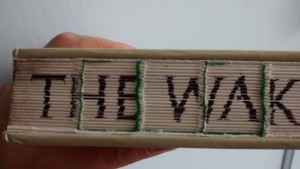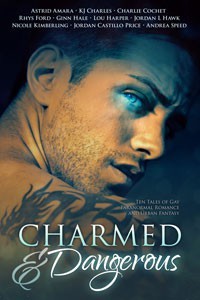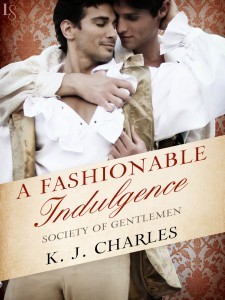K.J. Charles's Blog, page 12
September 28, 2015
Being Edited, or How to Take Criticism
Let’s start with the obvious: nobody likes it.
Any aspiring author will read plenty of blog posts telling you to suck it up / not be a special snowflake / fall on negative criticism with cries of glee. You should like criticism. Love it. You should be like a kung-fu movie monk, immersing his hand in boiling tar to become stronger. Etc.
That’s just bobbins. Even unjustified criticism can hurt like hell; even trivial throwaway comments can sting for years. Negative criticism feels bad because it’s negative; you shouldn’t feel even worse because you aren’t Superman about it. Take your emotions out (BUT NOT ON TWITTER OKAY), give them an airing to the cat, scream in the bathroom. Face how you feel. Because, all the people telling you to suck it up? They feel just as bad when they get their MS slammed. And if they don’t, if they indeed have asbestos hands for criticism and shrug it off, I’m afraid I question their commitment to their work. I don’t care is a fine thing to say but if you actually don’t care about your book, I’m pretty sure I won’t either.
Negative criticism is a painful and unpleasant necessity. The problem is that as a species, humans tend to believe that painful unpleasantness should be avoided at all costs. Wasp stings hurt like hell, so we kill wasps. That god-awful friend of a friend zeroes in on our every failing: we spend the party on the opposite side of the room. We avoid painful experiences. And thus authors may decide not to have their MS read by anyone other than their mum and a few trusted sycophants friends (which is a fabulous way to get more negativity than you can shake a stick at when the book publishes). They try to control reviews. And even the most sensible of us often try to deal with negative criticism by persuading ourselves it’s wrong.
It’s human nature. The king surrounds himself with courtiers who assure him that his subjects adore him, even while the mob is hammering at the palace doors. We don’t want to hear this stuff, because it hurts. Unfortunately, you need to face the negatives to improve, and we all know it.
So, a few tips from me in my capacity as an editor who hands out criticism, a writer who has to take it, and a human being who screws up.
Constructive v Negative
People make a big point of how criticism must be constructive. Reviews should always be constructive, apparently. (For the record, this is arrant nonsense. The reviewer is not a post-publication beta reader.) Nobody should say “this is bad”, we are told, they should say “this is how it can be better.”
Well, yes/no. An editor or beta reader who’s just there to sneer is a waste of time (a full blog post on this topic here). But actually, not all readers know how books can be made better. That’s quite a complicated skill: we call that person a development editor. It’s perfectly reasonable to say what’s wrong (“I just felt the hero never got sympathetic”) without identifying which chapters and conversations were the lost opportunities.
And sometimes things are bad. Sometimes the correct editorial response is, “You should cut this chapter”, “You should cut this storyline” or “I’m afraid this MS doesn’t work and we decline to publish.”
Here’s the thing: most people hate giving that out. It is very hard to be the bearer of bad news, particularly because so many people shoot the messenger. (I rejected a book once at work and the author was still blanking me at a conference five years later.)
Some people are just malicious, of course. But sincere well-meaning negative criticism is hard to write and deliver, and it should be considered seriously. If you don’t feel like you can tell the difference any more, ask a writer friend for a second opinion.
The more it hurts, the harder you should look
“If it isn’t hurting, it isn’t working” is bobbins, just ask an anaesthetist. But I am aware that the crit that makes me flinch most is the stuff I was worried about on some level. If you tell me, “I hate your crappy badly written book,” I’ll merely hope you get a disfiguring skin disease. If you say, “The book falls into obvious halves because of the clunking character arc,” I will be up all night rearranging scenes in my head because you’re right. (You bastard.)
“Well, they’ll just have to like it.” (Hint: they won’t.)
It takes a fair bit of nerve to write, and a lot of self belief. You need be true to your story, follow your dream, all that inspirational poster stuff. However, if you conflate that with believing your book is perfect, you will have a problem. The time to tell yourself “haters gonna hate” and sail serenely by the negative reviews is after publication, not at editing stage. Without negative criticism, you won’t get better.
But this is my book!
As an editor, I believe passionately that the book is the author’s: her voice, her choices, her style. However, sometimes it is the author’s badly written or unpublishable book. As an author, I won’t make changes that go against the spirit of my book and the soul of my characters, but you better believe I’ll listen if my editor/readers tell me things that suggest I’m failing in what I was trying to do, or the words I chose to do it.
What, me?
The edits received in the stoniest silence of all are the ones that cut at the writer’s goodness as a person. This scene seems to me to be verging on rape, and I don’t think you intended that. This comes across as racist. A lot of readers will find this offensive. People struggle to accept that they’ve been hurtful. Authors tend to be high-empathy people and women in particular are socialised to be nice. Most of us don’t want to accept we’ve been crass or prejudiced. And it is human nature to reframe the story in a way that shines a flattering light on our own character. I’m not prejudiced or ignorant: you’re just oversensitive. God, lighten up!
I’ve caused offence with clumsiness, and been called out for it. I did not enjoy receiving that criticism, any more than I expect the complainers enjoyed making it, and it would be a lot easier to reassure myself that I’m a Nice Person and the complainer is oversensitive, rather than accept that I’m not actually the super-considerate person/writer I’d like to think.
But I’m really not. And if I want to be better, as a writer or a person, I have to look hard at painful criticism, not in a defensive spirit but with an open mind. Because denying I was wrong will not help me do better, but listening thoughtfully might.
***
We all get stuff wrong. There’s nothing wrong with getting it wrong. Just grit your teeth, swear at the cat, and make an effort to get it right next time.
_________________________
KJ Charles dishes it out as an editor and attempts to take it as a writer. Her latest book is A Fashionable Indulgence, out now from Loveswept.
The post Being Edited, or How to Take Criticism appeared first on KJ Charles.
September 16, 2015
Storytime: The Worst Phone Call
I told this story as part of my keynote speech at the UK LGBT Fiction Meet. I’ve been asked for the text, which is far too long to type out. But for those who weren’t there, I give you my favourite publishing story: The Tale of the Worst Phone Call, a.k.a. How KJ Went Off Customer-Facing Roles Forever.
___________________
This was back in the day when I worked for a small independent publisher. We had a narrow rickety building, maybe 15 staff, and a very profitable mass market list to prop up the boss’s occasional wild eccentricities.
The mainstay of the mass market publishing was what I’ll call the Mega Books list. These were highly profitable because brutally cost controlled: cheap content; all the same format, paper and cover stock; and always reprinted in multiples of two or four because doing two or four books together made the print runs significantly cheaper for reasons I won’t bore you with.
The Mega Books were collections. There was the Mega Book of Adventure Stories, the Mega Book of Science Fiction, there was Fantasy, Historical, Detectives, accounts of historical events, political speeches, anything as long as you could get 528pp of text for cheap. And there was erotica. The Mega Book of Erotica, of More Erotica, of Historical Erotica, Gay Erotica, Lesbian Erotica, Dark Erotica, et cetera ad nauseam. And I mean ad nauseam, because this was not high-end stuff. It was twenty years ago, issues like ‘consent’ and ‘trigger warnings’ were not on the agenda (at least, not that particular acquiring editor’s agenda), and…let’s just say that erotica comes in every flavour, and this one was frequently ear wax.
Anyway. There I am, junior marketing gonk, busily propping up the British book trade (or playing Minesweeper, one of the two) when the phone rings.
Receptionist: KJ, we have a complaint, can’t make head or tail of it. Here you go. /click/
So I take the call, and it is a quite posh lady who is incoherent, incandescent with rage.
Me: May I ask what the prob–
Customer: I bought The Mega Book of Reportage and I am shocked. This is absolutely disgraceful. Disgraceful!
This book is all eyewitness accounts of important historical events. The worst you could say is it’s got a £6.99 price tag for mostly out-of-copyright material. I am confused.
Me: What’s wrong with it?
Customer: Page 416!
Me: What about page 416?
Customer, spluttering: I’m not repeating it! Look for yourself.
So I grab a copy, turn to page 416, and it’s a report about the Tiananmen Square massacre.
Me: Um, I’m looking at 416, what’s the issue here?
Customer: The issue? Just read it! Do you think that’s acceptable?!
Me: No, madam, I don’t, but you’re going to have to take that up with the Chinese government.
Customer: What?
Me: The events of Tiananmen Square are not my responsibility, so I’m afraid–
Customer, full shriek: THIS IS NOT ABOUT TIANANMEN SQUARE!!!
This escalates. She still won’t tell me what the problem is, but now she is also absolutely livid at my obtuseness. She says I am mocking her, that she is going to sue. I am utterly baffled.
Across the room, the production manager starts waving wildly at me. I put the customer on hold, and the production manager says the words I should have thought of.
Signature swap.
Here’s the thing: You make a book by printing on a huge sheet of paper, folding it over and over and cutting the edges. This creates a 32-page booklet called a signature. Put the various signatures together in the right order (10 for a 320-page book), sew or glue them at the back, stick on a cover, and Bob’s your uncle. Here’s a book printed without cover on the spine so you can see the signatures.
But, very, very rarely, the signatures can get accidentally swapped over. That is, if you have books A and B on press together, a signature of A might be exchanged with a signature of B. And now you have a copy of book A with 32 pages of book B in the middle of it, and vice versa.
Uh-oh.
Me: Did we reprint Reportage recently?
Production manager: Yes, we did.
Me: Did it go up with something else?
Production manager: Oh yes.
Me, bracing: Go on.
Production manager: Gay Erotica.
Of course. I reach for the file copy of Gay Erotica, turn to p.416…
…right in the middle of a fisting scene.
Of course, fisting scenes, like any sex scene, can be written with love, care and respect. This one was not. Not even slightly.
Clearly this was a horrendous fail on our part. The only way it could have been worse is if it had been Dark Erotica, for which the first proofreader actually walked off the job. It is not OK to sell erotica to people who didn’t want to buy it, the customer has a faulty product and a legitimate grievance even if she isn’t very nice, and the only professional response is a sincere apology.
Unfortunately, at this point I was laughing so hard I couldn’t breathe. The production manager was sliding off her chair howling, the receptionist who’d come up for a nosey was lying on the floor hammering the carpet with her fist, and it took several minutes for me to get a grip on myself. All the while the customer was still on hold, and not getting any happier.
Me, finally: Shut up, all of you. I have to take the call, she’ll hear you. SHUT UP.
[takes customer off hold]
Customer: WELL???
Me: Madam, we’ve discovered what the problem is, and I can only apologise. This is an incredibly unfortunate printers’ error and I am very, very sorry. I assure you, we are all extremely upset about this—
At which point the publicity manager swings into the room and announces, at full volume and entirely audible to the customer at the other end of the phone, “Oh my God, I just heard, that’s hilarious!”
***
I will draw a veil over the rest of the call. I can only add that some poor so-and-so must have paid £6.99 for a copy of Gay Erotica and got hit by 32pp of Tiananmen Square at just the wrong moment, but at least they never contacted me about it.
And that’s how I decided my future did not include customer service.
____________________________
KJ Charles is a writer and editor who still twitches when the phone rings. Her most recent title is A Fashionable Indulgence.
If you get a book with signature swap (repeated pages or randomly wrong text), just call the publisher and they’ll replace it. There’s no need to shout.
The post Storytime: The Worst Phone Call appeared first on KJ Charles.
September 9, 2015
Declarations of Interest and why you should
So this email has been going round on Twitter shared by @lotte_le:
Let’s have a refresher course on basic ethics, shall we? As follows:
DECLARE YOUR INTEREST.
That was quick, eh? See you next week!
Okay, we have space for a bit more.
Declaring interest is a bedrock principle of functional communities. If you are a councillor who awards the contract for rubbish collection services, you must declare that your brother-in-law runs the bidding garbage truck company. If you are asked to be in charge of an inquiry, you need to say that one of the accused is a family friend. If you run a website that reviews cosmetics, you should mention that you run your own cosmetics company under a different name.
It may be that your brother-in-law’s company is the best by miles, or that you would apply the law no matter what it cost your personal life, or that you scrupulously avoided ever plugging your own product on your site. Conflicts of interests happen all the time; we all live in small worlds. If I review an m/m romance, it’s quite likely that I will have interacted with the author on social media, and as a freelance editor it’s not outside the realms of possibility I have or will have worked with them.
But the only way to deal with interests is transparency. You put your interest out there, and let people take a good hard look at your behaviour and your opinions in the light of what they know.
And if you don’t declare interests, people have the right to draw their own conclusions as to what motivated your decisions, which may well be worse than the reality. You might get your brother-in-law the contract because you really think his is the best company, but the voting public is entitled to assume you’re taking a backhander because you hid your interest. Your family friend might be innocent, but who will believe it when the inquiry stinks of cover-up? What value do your genuine negative lipstick reviews have when people decide you were trashing your rivals?
There are laws about this stuff. The Federal Trade Commission in the US requires that you disclose any ‘material connection’ such as payment or free product accepted in return for a review, because your review is endorsing the product. If I might decide to buy a book on the basis of your five-star rave, I have a right to know if you actually spent money on it or not. I definitely have the right to know if you were morally blackmailed into leaving it by big sad kitten eyes and pleas of ‘but bad reviews hurt authors!’
The free book business is a tricky one. The whole point of the ARC (advance reading copy) is that the author gives the reviewer something (a free book), and in return gets a benefit (a review). You might well feel this teeters on the edge of dodgy by its very nature. Let’s be honest, it kind of does.
I have been contacted by readers who have offered to leave five-star reviews if I give them a free copy. Blog tour companies have been known to ask the bloggers to suppress 1 or 2* reviews. Goodreads is full of books that have been five-star-spammed by hardcore fans in return for freebies. And, as we see here, there are authors who feel that the act of giving a free book entitles them not just to a review but to a good review. (There are also, needless to say, vast numbers of authors who would never dream of policing reviewers, and reviewers who are scrupulous in declaring interests. There is nothing wrong with the ARC system except when it’s abused. But it’s basically an honour system, and any honour system is open to abuse by the dishonourable.)
This hurts everyone in every direction. It bumps the unethical author up the rankings, it disappoints the reader suckered into buying overpraised books; it damages the authors who don’t game the system; it devalues the honest reviews that people slave over. It undermines the reading community. It stops the system working.
A declaration of interest does not “discredit a review” as the email says. It does the opposite, by demonstrating that you have considered basic ethical principles. Hiding that interest discredits the reviewer, the author, the book, and the whole damn system. No author should ever ask for that, and no reviewer should ever feel obliged to agree.
A quick checklist for the ethically challenged:
It is fine to offer an ARC in return for a review.
It is never okay to ask for only a positive review.
It is never, ever okay to ask for a negative review to be suppressed.
It is never, ever, ever okay to ask a reviewer not to declare her interest. You are asking her to be dishonest and possibly to break the law.
If you are prepared to violate your personal integrity and the law, you should probably set your price higher than a free e-book. Have some self-respect.
The post Declarations of Interest and why you should appeared first on KJ Charles.
September 2, 2015
Which comes first–chicken, egg, book?
My husband has an idea for a book. It’s a great idea based on a bit of real-world technology that would make a cracking thriller. He’s been brewing this for a year or more. Finally, he asked me plaintively, “Okay, I’ve got the idea for the book, but how do I get the characters? How do I know who should be in it? The people would be different depending on where I take the plot, but the plot depends on the characters—which comes first?”
Welcome to my life.
I’m told some people get a character pop up and demand a story. For me it always starts with a nugget of inspiration: a setting, a weird historical fact, a concept. But how do you take a concept and add the characters? And when you have a concept and characters, what about a plot?
You see this go wrong a lot. Thrillers where it’s quite obvious that the author had a brilliant idea, worked out a plot to maximise it, and bolted in some plastic people to go through the required actions. Romances where an adorable pair of lifelike characters have a meet-cute and then not very much actually happens.
It is hard to do right. It feels really hard every time I start thinking about a new book. What’s it about, who’s in it, what’s going to happen? Which comes first?
Short answer: neither. Neither comes first, because it’s a push-me-pull-you, back and forth. Crossing over the same ground, over and over in different directions and permutations, weaving the threads. This is all getting a bit metaphorical so here’s how a story I wrote recently happened:
I know that I want to write about X thing.
Hey, the Victorians had waste-men who collected and sold on used paper! Suppose one of them got some paper he shouldn’t have?
Start thinking about characters. I write romance so I need a pair.
The waste-man, obviously. And the guy who’s looking for the papers, who has to spend ages going through the waste-heaps with bonus sexual tension developing. Who is the other guy? Lawyer, maybe, looking for a missing will?
How does the concept lead to a plot?
The lawyer is searching for the document and…eventually finds it? Meh. What’s this about anyway? What’s at stake here?
Go back to the concept.
The waste-man has paper that’s dangerous. To him, or to other people? How’s it dangerous? If it’s a will, who knows he’s got it? If it’s state secrets, ditto.
And the characters:
The waste-man is going to blackmail the lawyer—no. Or is the other guy an agent of the state? But he could just seize it. The waste-man is going to sell—no. The waste-man is illiterate, maybe, so he doesn’t know to give it back? Um. Or is the paper in a foreign language…
It’s magic paper, you spanner. That’s what it is. It’s magic paper, and the waste-man doesn’t do magic, and it does, I don’t know, VERY BAD THING TBC, and the other guy is a magician.
Leap to the plot!
Because someone lost some papers and the magician has to find them and the papers do VERY BAD THING TBC and they have to work together to stop the thing. Which is when they fall in love.
But wait! Who are these people to be in this situation? What about them causes them to clash with each other and with the plot?
Um. The waste-man is working class, the magician is his opposite… the magician is in a panic and the waste-man has to talk him down… the waste-man is a decent guy…
Hang on, hang on. If these papers are so bad and dangerous, what was the magician doing with them?
Plot and Character answer together: He was doing bad things.
There was a lot more to be braided in from here. The magic system: it’s got to have to do with writing, because paper, and it’s got to cause the VERY BAD THING TBC, and we have to know why the magician would do bad things. Which takes us back to the characters: why would the magician do that? Is he a bad person, and if not, how was he brought into it? What about him means the waste-man works with him–or is he forced to? Which takes us back to the plot…
 That is a very very short summary of how the story ‘A Queer Trade’ came together, or alternatively a very long way of saying that plot is character in action. You shuttle back and forth, from concept to character to plot, with each step leading to the next. If X, then Y. If character A is like this then he can’t behave like that, so he behaves like the other instead, and therefore character B will do this…
That is a very very short summary of how the story ‘A Queer Trade’ came together, or alternatively a very long way of saying that plot is character in action. You shuttle back and forth, from concept to character to plot, with each step leading to the next. If X, then Y. If character A is like this then he can’t behave like that, so he behaves like the other instead, and therefore character B will do this…
It can start from anywhere. I could have thought of the VERY BAD THING TBC first and worked from there; I could have imagined a stoic Victorian labourer faced with a panicking and slightly fey magician and wondered how they met. And it can go anywhere. In a different mood I could have taken the lawyer route and written a lovely missing-will story with no external threat and a character-based plot. As it happens, I was in the mood for animated corpses. I so often am.
It doesn’t matter where you start, and you don’t need to know where you’re going. What matters is that you weave plot and character together as you go. Because if you try to develop one first and then fill the other in on top, you might have a brilliant plot, or a marvellous character study, or a genius concept, but you won’t have a book.
__________________
‘A Queer Trade’ appears in the anthology Charmed and Dangerous.
My most recent release is A Fashionable Indulgence, the first book in a linked Regency trilogy. Don’t even talk to me about plotting *that* out.
The post Which comes first–chicken, egg, book? appeared first on KJ Charles.
August 11, 2015
A Fashionable Indulgence release day!
A Fashionable Indulgence is out now! Go buy it!
That’s it, basically. I’m keeping this brief because I am actually on holiday right now. (No, you booked two weeks on a campsite in the middle of France right over your book launch. Ahem.)
This is book 1 of my Society of Gentlemen trilogy published by Loveswept, which is about Regency gentlemen, radical politics, class divide, nice clothes, murder, sordid goings-on at all levels of society, and why you should never trust puce. (THIS IS IMPORTANT.)
This is the first in a trilogy of m/m Regency romances about a group of gentlemen with unconventional desires in a time of social and political turmoil. Reviews are nice so far! Book 2, A Seditious Affair, is out in December. The linked story that started it all, ‘The Ruin of Gabriel Ashleigh’, will be available as a separate story in October, more soon!
You can get it, should you so wish, at Amazon.com, Amazon.co.uk, ARe, the publisher and all the usual places. I have been/will be yattering on about stuff at the following locations throughout August, and there will be giveaways. I’ll link posts as they go up where possible but, like I said, holiday.
10 Smexy Books (with Ava March)
10 Bookaholics Not-So-Anonymous
12 Joyfully Jay (with Ava March)
12 All About Romance (with Ava March)
13 Fiction Vixen (with Ava March)
14 Prism Book Alliance (with Ava March)
14 Bayou Book Junkie
15 Sinfully… (with Ava March)
17 Boys in our Books
19 Christine’s Words
Which is why I’m not posting anything else here.
I’ll be back in late August with other new news, including on the Charmed & Dangerous anthology. Don’t do anything I wouldn’t do!
The post A Fashionable Indulgence release day! appeared first on KJ Charles.
July 21, 2015
Charmed and Dangerous anthology news
So, there is a new anthology coming: Charmed and Dangerous, a collection of ten m/m paranormal romances. If you like mmpr (and if you’re reading this I have to assume you do or this will be like one of those really awkward party conversations where it turns out nobody knows anyone else there), you are likely to be just slightly thrilled. Check out the gorgeous cover, and also the author list. I am unspeakably excited to be part of this.
When Jordan Castillo Price asked me to write a story (I like to drop that phrase into conversation), I set out thinking about ideas, and reached, as I often do, for Henry Mayhew. His 1860s book London Labour and the London Poor is an early example of social research, and includes long accounts of what his interviewees said, in their own words. (Ish, at least, there are questions over Mayhew’s literary ambitions, but let’s not be fussy.) Mayhew gave us three hulking volumes that told us how London’s least regarded workers and street-people lived.
One of the street trades was that of waste-man, the people who bought used paper and sold it on for packing and wrapping. Mayhew interviewed a waste-man who explained what his job was. I don’t know if there could be a more plot-bunny-packed paragraph than this; in particular, I would ask you to think about the effect of the last line of this quote on a writer of Victorian gay romance:
An old man dies, you see, and his papers are sold off, letters and all; that’s the way to get rid of all the old rubbish, as soon as the old boy’s pointing his toes to the sky. What’s old letters worth, when the writers are dead and buried? Why, perhaps 1½d. a pound, and it’s a rattling big letter that will weigh half-an-ounce. O, it’s a queer trade, but there’s many worse.
I read this paragraph and knew that I had my story for this anthology: an old man dying and his papers sold on. Which, since this is a paranormal romance story, are magical papers, bought unwittingly by a waste-man, which must be retrieved by the apprentice warlock before anything dreadful happens. (This is me. Hands up who thinks nothing dreadful will happen.)
Here’s the blurb for my story:
Apprentice magician Crispin Tredarloe returns to London to find his master dead, and his papers sold. Papers with secrets that could spell death. Waste paper seller Ned Hall can’t resist Crispin’s pleading—and appealing—looks. But can the waste-man and the magician prevent a disaster and save Crispin’s skin?
It is, of course, called A Queer Trade. (You wouldn’t have resisted that either.) And while it is an all-new story with completely new characters, sharp-eyed readers may see some old friends passing through.
Charmed and Dangerous is out 25 August, a mere fortnight after A Fashionable Indulgence, and weighs in at a startling 180K word length. Have fun!
If you sign up to my newsletter I’ll remind you when this and other cool things come out. I promise not to spam.
The post Charmed and Dangerous anthology news appeared first on KJ Charles.
July 10, 2015
Walking and Working: Treadmill Desk trip report
Back story: My back hurts.
I do a desk job. I work 6.30-3, longer when I can, all at a keyboard. I often fail to move for three hours at a time (and yes, I tried setting a timer to get up, and yes, I just ignored it). I sit alone in a shed so I don’t even have to get up for meetings, looking at photos of other people’s babies, or cake. And although I have a good desk and chair, my back has begun hurting a lot. It hurt when I sat down for dinner, then it started hurting by noon; soon it was hurting half an hour after I sat down, and I was eating meals standing up because sitting was so uncomfortable.
It’s becoming clear that sedentary lifestyles are bad for us. Apparently lack of exercise now kills as many people as smoking. But who has time to do four hours’ exercise a day if you also have a job, a partner, maybe kids? How do you do a desk job while not sitting down all day?
If you can’t chuck it all in and go lie on a beach just yet, one answer is a treadmill desk. This is basically like a running machine but slower, with desk, and you type while walking at a pace that suits you. These are catching on in the US but what seems to be the first dedicated UK store has only just opened and I found it pretty hard to find opinions that weren’t obvious PR based on free loans of machines. Frankly, given the cost of these things, I wanted a real person to talk about them.
Well, I bought one, so the real person is me.
I got the Lifespan 1200 treadmill, which is meant to be used for six hours a day. The cheaper model is recommended for three hours a day, and I was torn about whether to spend the extra money and if I’d really use it that much. Oh my God I’m so glad I did. I have not got off this thing. I have sat down for maybe an hour per working day for the past week. Other than that, I’ve been walking. I drink tea at 2mph. It feels incredible. The treadmill goes up to 4mph if you’re some kind of superhero but I started around 1.2mph and am now very comfortable editing at 2mph, and it’s pretty quiet: the motor is white noise rather than a distraction for me.
My desk, with clutter, blackboard etc

I got the Lifespan desk to go with. It’s manually adjustable so it’s the right height with comfortable wrist supports, and it’s really sturdy and large – accommodates laptop, separate monitor, wireless keyboard, multiple mugs. It also has a console which tracks your time, steps, calories and distance walked. This is really addictive. It tracks you all day and keeps the data during breaks, unless you accidentally yank the safety cord and reset it, which I have only done once so far.
4.18 miles by 9.30am. Not bad, eh?

A lot of people ask if it’s really possible to type while walking. I was worried about this because I am horrifically malcoordinated. I have punched myself in the face more than once. My school made me do a spatial awareness test and my score went off the bottom of the chart. I am totally fumblefingered in the way only a bookish left-hander can be. So I did fear this would be an agonising learning curve.
Hahaha no. It took about an hour to adjust, if that. My crappy four-fingered typing is every bit as fast and accurate as while sitting, i.e. not very, but the walking makes zero difference. And it doesn’t impede my concentration. This week I have written a story and a chunk of book, edited two MSS and knocked out five blog posts, all on foot.
Walking all day did prove hard on the muscles at first, which is only to be expected given I was so sedentary before. The machine is comfortable, my dodgy knee is fine, but I really felt it in the bits that attach my legs to my hips. This is wearing off, and probably wouldn’t have happened if I had started slower or got off the machine occasionally, but I won’t and you can’t make me. You could build up, and intersperse sitting and standing to get the muscles going more gently, but I honestly have not wanted to sit down at all. This isn’t ‘tiresome exercise that must be done': I have a desk and chair behind me and I don’t want to use them.
Tell you what else: core muscles. I went to the gym for the first time in six weeks and did 75 sit ups. Walking all day strengthens your back and stomach muscles more than slumping over Twitter. Who knew.
The treadmill is comfortably wide, which is good, because so am I.

This isn’t meant as a weight loss device. I expect if you kept up the exercise you were doing before as well, and didn’t increase your calorie intake, you’d lose weight. But you’re walking slowly, and that isn’t going to make the weight drop off. That said, even standing burns a lot more calories than sitting, and your leg and arse muscles are huge calorie munchers. I kind of hope to lose a few pounds over the course of a few months. Mostly, though, I’m thinking of this as a ‘not going to die from sitting’ machine.
And a ‘no back pain’ device. Because my back doesn’t hurt. It stopped hurting as soon as I stopped sitting all day. When I do sit, it’s fine. The kitchen chairs that had begun to seem torture devices are just chairs. I did four hours’ work then sat through my daughter’s ukulele concert with no more discomfort than you normally get from listening to 60 seven-year-olds on the ukulele (i.e. it was hell, but my back had nothing to do with that). I feel the need to sit in the evening much less, too. Standing just feels better. I am more awake, I am sleeping really well, which is unusual. Being on my feet, being active while I work, feels good.
These are undeniably expensive things. I paid a painful £1500 for mid-range treadmill, desk and installation. (The £ cost seems to be equivalent to the $ cost, presumably because of bigger US demand.) You could bodge up your own desk, I guess, if you were competent and didn’t mind not having the data. They are also big: the set-up takes up a good third of my writing shed. So there’s no denying that you need room and cash to make this happen at home. If you work in an office, get to HR right now and see if they will cough up for a few machines for people to share. (You can get standing desks, which are obviously much cheaper; I can’t stand up for very long without discomfort so that wasn’t an option for me.)
So, yes, it’s a lot of money, no question. But. I have had two trapped nerves because of my crappy deskbound life, giving me weeks of agony, costing me hundreds of pounds in physio bills, and losing me days of work because I couldn’t sit at a desk. I’m now freelance: days off are lost money and deadline disasters. I calculated that if this machine means I avoid another two trapped nerves it will have paid for itself as well as saving me a lot of pain. Plus, I have one spine, which no amount of money will replace when it breaks down, and very, very limited time to exercise any other way. For me, this desk has so far been worth every penny.
This is a completely unbiased report: I paid for this desk with my own (total bonus audio rights sale) money and nobody’s giving me anything. And my conclusion is that I love this machine; I love the concept of a treadmill desk; it really works. The book I’m currently writing while walking is called A Gentleman’s Position. Mate, that position is upright, and that goes for ladies too.
This blog post was written in 2.3 miles.
The post Walking and Working: Treadmill Desk trip report appeared first on KJ Charles.
June 19, 2015
Victorian Occult Detectives: A Warning to the Curious
My new book is a romance (long, sometimes difficult, ranging over twenty years) between Simon, a Victorian occult detective, and his companion Robert, a journalist and writer. What do I mean, a Victorian occult detective? Ah, well, I’m glad you asked me that.
 The Victorian era is famous for its incredible technological progress. This was a century that went from sail power and horses to a massive rail network and steamships capable of crossing the Atlantic. 1819 was the last full year of the Regency; by 1899 Marconi was sending radio across the English Channel, the paperclip had been invented, the theory of evolution was widely accepted, and we’d had the first motorcar companies and indeed the first fatal car crash. “Let the great world spin for ever down the ringing grooves of change,” wrote Tennyson, who lived 1809-1892, and must have been pretty damn confused by it all.
The Victorian era is famous for its incredible technological progress. This was a century that went from sail power and horses to a massive rail network and steamships capable of crossing the Atlantic. 1819 was the last full year of the Regency; by 1899 Marconi was sending radio across the English Channel, the paperclip had been invented, the theory of evolution was widely accepted, and we’d had the first motorcar companies and indeed the first fatal car crash. “Let the great world spin for ever down the ringing grooves of change,” wrote Tennyson, who lived 1809-1892, and must have been pretty damn confused by it all.
Because it was scary. Evolution upended many accepted ideas about Biblical accuracy, chronology and how creation happened. It displaced God from the centre of many people’s world view, leaving a hole that had to be filled with something. There was a religious revival, spreading a peculiarly joyless Evangelical faith of the kind people often associate with the Victorians, but there was also an explosion of belief in dissenting sects, cults, and the supernatural. This was the great era of table-rapping, ectoplasm, séances.
…the religious and scientific strands of the century [were] closely intertwined. Every scientific and technological advance encouraged a kind of magical thinking and was accompanied by a shadow discourse of the occult. For every disenchantment there was an active re-enchantment of the world. (Roger Luckhurst, excellent article.)
It was easy to confuse miracles of nature with the supernatural. The occult started to be presented as if it were a new branch of science, subject to rules and study and investigation. And, honestly, why not? If telegraphy could send words whizzing through wires, why shouldn’t telepathy send words whizzing between brains? If magnetism could somehow produce electricity that made light, why couldn’t animal magnetism (aka mesmerism) produce a current that caused healing?
The occult detective was a response to this baffling period of grasping for belief, and confronting new science as it remade the world. It brought the old Gothic tradition together with the exploding genre of detective fiction, to show us people confronting the mysteries of a scary and unknowable world with the tools at their disposal. Thomas Carnacki, ghost-finder, uses an Electric Pentacle to keep evil at bay, and half of his cases show him detecting human fraud rather than supernatural activity. The good guys in Dracula attempt to save a vampire victim by means of blood transfusions. Plenty of the detectives didn’t go to occult school to be called Mr: we have Dr Hesselius, Dr Taverner, Dr Silence, and the boss of them all, Professor van Helsing, with a string of letters after his name. And even when the occult investigators are amateurs, they are very often academics. Most of MR James’ stories centre on scholars, using their powers of research, big libraries and intelligent questioning to solve the central mystery of what the hell is going on.
The occult detective says: the world is big, unknowable and terrifying, but we can get a grip on it with courage, by applying our knowledge, using our heads, working together. It stands up for human potential. If you have a heart, some books, a brain, and preferably a loyal assistant, you can take on whatever dark horrors the Gothic past throws at you and win.
That’s where romance and the occult detective meet. They’re both, fundamentally, about how people find light in a dark and scary world, about what the human brain and heart can do. And that’s why I wrote my occult detective stories as a romance, or possibly why I wrote my romance as occult detective stories. Either way, it worked for me.
——————————————–
KJ Charles is a Rainbow Award-winning romance writer and freelance editor. She blogs about writing and publishing , spends too much time on Twitter , and has a Facebook group for book chat and sneak peeks. The Secret Casebook of Simon Feximal , a Victorian occult m/m romance, is out now from Samhain.
A story too secret, too terrifying—and too shockingly intimate—for Victorian eyes.
A note to the Editor
Dear Henry,
I have been Simon Feximal’s companion, assistant and chronicler for twenty years now, and during that time my Casebooks of Feximal the Ghost-Hunter have spread the reputation of this most accomplished of ghost-hunters far and wide.
You have asked me often for the tale of our first meeting, and how my association with Feximal came about. I have always declined, because it is a story too private to be truthfully recounted, and a memory too precious to be falsified. But none knows better than I that stories must be told.
So here is it, Henry, a full and accurate account of how I met Simon Feximal, which I shall leave with my solicitor to pass to you after my death.
I dare say it may not be quite what you expect.
Robert Caldwell
September 1914
The post Victorian Occult Detectives: A Warning to the Curious appeared first on KJ Charles.
Welcome to my new home! With salad, cat and giveaway
I’ve moved! The blog now lives here, along with all my other bits and pieces: free reads, link to Redbubble shop if you feel the need for a Charm of Magpies mug or suchlike, info about my editorial services, explanation of the Antikythera mechanism*, series reading order, and–drumroll–newsletter.
This will be occasional, like once a month or less: when I have book news, basically. Feel free to sign up, making your way past that new anti spam thing they do where you have to identify pictures of salad and one of the pictures is some horrific fruit-and-anchovies-in-gelatine thing from 1950 and you spend the next half hour in a state of salad definitional uncertainty.

I don’t know. Is this salad?
As a housewarming hello, I’m going to give away one e-copy of your choice of my books to each of two commenters, selected at random, to be drawn 24 June 15. Just leave your name in the comments (stick your email in the form thing so I can reach you) and say if you think that’s salad. Or nice things about the new website, or anything else you prefer. It’s Liberty Hall** round here.
*may have been dropped for reasons of space
**”This is Liberty Hall, you can spit on the mat and call the cat a bastard.” (Pictured.)

Bastard, honestly.
The post Welcome to my new home! With salad, cat and giveaway appeared first on KJ Charles.
Change of Address: I’m moving!
I am moving my website and blog over to a shiny new home at kjcharleswriter.com.
Please go on over there (it has cool stuff such as proper books page! Reading order! um…Stuff!) and update your feed/address book if you want to keep getting blog posts. This place will remain up for the foreseeable but there will be no new posts fed from here. Oh, and I’ll be doing a newsletter which you can sign up for here or avoid, to taste.
As bribe (if you’re timely, it runs to 24 June) I’m doing a giveaway over at the new place. But I’m not saying what. You’ll have to go see. Ha!
So that’s kjcharleswriter.com for all your needs in the way of editorial advice/explosive book-related ranting/random historical stuff/gay Victorian occult detectives/other. See you there.






